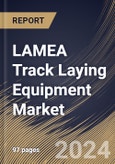The continuous evolution of technology has significantly influenced the adoption of track laying equipment. Modern machines have advanced features such as automation, GPS integration, and real-time monitoring systems. These technological enhancements improve the efficiency of track laying processes and contribute to safety and precision. Adopting such cutting-edge technology is a key driver for contractors and operators looking to stay competitive and deliver high-quality railway infrastructure.
The primary and fundamental use of track laying equipment is in installing railway tracks. These machines have advanced mechanisms to lay tracks, ensuring proper alignment, spacing, and stability. Whether it's a new railway line, an extension, or an upgrade, track laying equipment is indispensable for accurately and efficiently installing tracks. Before tracks can be laid, the track bed must be prepared to provide a stable foundation. It is used for excavation, grading, and compacting the soil or ballast to create a well-prepared bed. The total stability and endurance of the railway infrastructure depend heavily on the proper preparation of the track bed.
Ballast is a critical component of railway tracks, providing stability, drainage, and support to the track structure. It is employed to place and distribute ballast accurately along the tracks. This ensures the ballast is evenly distributed, maintaining proper track geometry, and preventing issues like track settlement and misalignment. It is equipped with features for aligning and tamping the rails. Rail alignment ensures that the tracks follow the designated path, while tamping involves adjusting and compacting the ballast beneath the ties to maintain the desired track geometry. This is crucial for trains' safety and smooth operation, preventing derailments and ensuring a comfortable ride for passengers.
Expanding urban rail projects in Saudi Arabia will likely increase demand for track laying equipment. The expansion of urban rail aligns with the increasing urbanization and population growth in Saudi Arabia. The Saudi Arabian government's commitment to investing in urban rail projects is in line with its Vision 2030 initiative, which aims to diversify the economy and improve the quality of life for citizens. The expansion of urban rail networks in Saudi Arabia may drive the adoption of advanced technologies and innovation in track laying equipment. Urban rail projects contribute to improved connectivity and accessibility within cities in Saudi Arabia. Thus, due to these aspects, the market will expand across the LAMEA region in upcoming years.
The Brazil market dominated the LAMEA Track Laying Equipment Market, By Country in 2022, and would continue to be a dominant market till 2030; thereby, achieving a market value of $22,844.2 Thousands by 2030. The Argentina market is exhibiting a CAGR of 7.5% during (2023 - 2030). Additionally, The UAE market would experience a CAGR of 6.4% during (2023 - 2030).
Based on Application, the market is segmented into Heavy Rail and Urban Rail. Based on Type, the market is segmented into New Construction Equipment and Renewal Equipment. Based on countries, the market is segmented into Brazil, Argentina, UAE, Saudi Arabia, South Africa, Nigeria, and Rest of LAMEA.
List of Key Companies Profiled
- Plasser & Theurer
- Larsen & Toubro Limited
- Techne Kirow GmbH
- Weihua Group Co., Ltd. (Henan Weihua Heavy Machinery Co., LTD.)
- Matisa Matériel Industriel S.A.
- CRRC Corporation Limited
- Salcef Group S.p.A.
- Enviri Corporation
- BEML Limited
- Vossloh AG
Market Report Segmentation
By Application- Heavy Rail
- Urban Rail
- New Construction Equipment
- Renewal Equipment
- Brazil
- Argentina
- UAE
- Saudi Arabia
- South Africa
- Nigeria
- Rest of LAMEA
Table of Contents
Companies Mentioned
- Plasser & Theurer
- Larsen & Toubro Limited
- Techne Kirow GmbH
- Weihua Group Co., Ltd. (Henan Weihua Heavy Machinery Co., LTD.)
- Matisa Matériel Industriel S.A.
- CRRC Corporation Limited
- Salcef Group S.p.A.
- Enviri Corporation
- BEML Limited
- Vossloh AG








